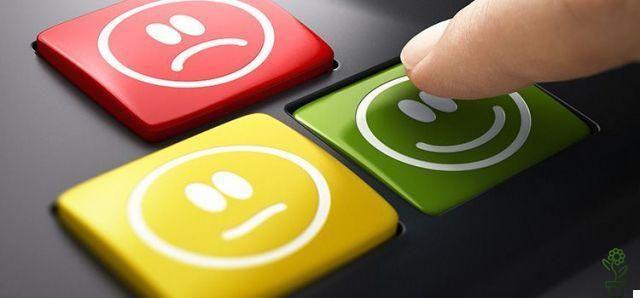What is happiness? Can we be happy?
Before starting, let's clarify a concept: we all want to be happy.
By this I mean that we want to feel good, feel positive emotions, live with serenity, have a feeling of peace and calm. I'll ask you a couple of questions to be clear:
- Do you prefer to feel good or feel bad?
- Do you like anger or joy more?
- Do you prefer to feel relaxed, or relaxed, or prey to anxiety and worry?
They don't need to guess the answers. There, in this sense I say that we all want to be happy. Before you even define it, now you know what happiness we are talking about: what we all want.
We will see the nuances shortly, but remember that everyone's goal is to feel good. Now we can figure out how to get there.
What is happiness: conditioned or unconditional?

Defining happiness is difficult because if you ask 100 people "what is happiness for you?" you will get roughly 100 different responses.
To get an idea of the many meanings we can turn to wikipedia, but I don't want to start from my definition, I'll let you read it later.
There are two ways of understanding happiness:
- Conditioning, that is what you feel only if something specific happens. The words of others, a result you want to achieve, a behavior towards you.
- Unconditional, that is what you just feel. It doesn't matter what happens, you are still happy.
Obviously the second form seems hardly feasible, almost a utopia or a kind of illusion. But let's talk about it shortly.
The first, what we could define conditional happiness is instead the most logical, the most common, in short, the one we can all experience in our life.
I mention it to you both because this list of key elements is interesting, and because almost all fall into the first type, that is, that happiness that it depends on something to be able to try it.
Some elements are, for example:
- Keep busy and be more active.
- Spend more time socializing.
- Be more productive by carrying out activities that are valuable to us.
- Develop a sociable personality.
- Having better and deeper intimate relationships, meaning time spent with important people.
These are all positive voices, of course, but affect your happiness.
For example, you need to have good relationships with others, do activities you enjoy, or be sociable.
These are all positive things, as mentioned, but they depend on you only in part.
To be with others, they must want to be with you.
Often you will be forced, or forced, into activities that you may not like.
What if you fail to develop these points? Two things basically:
- You will not be happy.
- These elements will become a fixed nail to be realized at any cost.
Conditional happiness prompts us to achieve something to be happy.
A close family, a loving partner, sincere friends, a nice home, a good job, social successes and whatever else.
This will lead you to depend on these factors that, very often, you will not be able to control.
Remember that we all want to be happy.
If this is due to out of control factors, it means that it will be easy to feel frustration, disappointment and anger when these elements do not give us the happiness we desire.
Try thinking about the last time you got mad, or mad.
- Had anyone misbehaved?
- Didn't you get something you wanted?
- Did you miss an opportunity?
- Did you have to deal with an unforeseen event that created inconvenience or problems for you?
Any reason you can find, if we dig deep, it will be tied to an obstacle to your well-being.
Negative emotions arise when we see a threat to our happiness.
The more you don't have control over the things that need to make you happy, the easier it is to feel these negative emotions.
Not controlling it yourself, your happiness is more at risk. Something could go wrong.
Before continuing I propose that you measure your ability to live a happy life.
Like? With my test: a few questions that will help you think a lot about how you live your life today.
It will allow you to understand if today you are capable of living a deeply happy life.
Start quiz Continue Complete the form below to see the results Leave your name and email to subscribe to my newsletter and receive the test results. Your name: Your email: I consent to the processing of my data in compliance with the privacy regulations. Show results
Happiness, satisfaction or pleasure?

The simplest thing is to confuse happiness with satisfaction. But they are not the same.
Are you satisfied, or satisfied, whenever you get what you want.
Satisfaction is always a conditioned emotion.
The examples given above are more satisfaction than happiness. On the other hand, satisfied, it means that you got what you wanted.
If happiness is reduced to this, then it is normal that we begin to make lists of goals to be achieved at all costs: we want to be happy. For instance:
- Receive love from loved ones.
- Have the esteem and respect of others.
- Be successful at work.
- Having the money to live a comfortable and peaceful life.
- Meet a special person who loves us.
The list is endless but it is always about things that they only partly depend on us and that we almost always do not control.
If to be happy we try to get everything we could possibly want, we never will be. In fact, as soon as you get something what happens?
The satisfaction does not last long, by its nature, and you soon focus on the next goal.
It will be always something you miss and that you have to conquer.
The result is a continuous race to the next finish line and many unpleasant effects:
- Anything you want it will create tension, fear of not making it, anxiety in the decisive moments: what if I don't succeed? What if I fail?
- The things you get you may always lose, I'm out of your control. What if it breaks? What if I lose it? What if she stopped loving you?
- Anything you want could be taken away from you by someone else. What if they steal it from me? What if someone took this person I love away from me?
The satisfaction does not last long, it is linked to something that depends very little on you and creates a flood of negative emotions.
Think about anger, disappointment, or sadness - not all of them come about because you don't have, or you lose, something you think is important?
Through satisfaction we can aspire to short moments of conditioned happiness.
You can have more, a lot. Think if you could always be happy.
Whatever happens, you are fine, and nothing can upset you.
Impossible?
No, but let's take it easy, start to understand that satisfaction is not happiness and on the contrary it takes it away.
But happiness it's not even pleasure.
Pleasure always comes from an external stimulus, such as a chocolate cake, a massage, a hug, a compliment.
The point is that pleasure is something that does not last long, passes quickly and to which we get used to quickly.
At that point we start looking for something else, why we get tired of the same things. We are always looking for novelty, different stimuli, because we go towards addiction.
The things that give us pleasure they tend to tire us out soon. And then we want more. If I say boredom, nothing comes to mind?
How many times have you abandoned that amusements at first they were great but over time they became boring and disappointing?
The pleasure we feel passes quickly and always leaves only one wish: have more, have more.
So we easily become employees,it from situations or people who have to give it to us.
Happiness, paradoxically, we push it away looking for pleasure.
In a book by Matthieu Ricard, The Taste of Being Happy, I read an example that I really like.
It's like when we feel itchy. We instinctively seek relief by scratching.
But the relief does not last long because the itching returns more intense, and we rub the skin until it bleeds.
We have confused relief and healing.
When we decide not to scratch again, even if we really want it, it is not because we think that scratching is bad, but because our experience has taught us that skinning is even more painful, and that the torture will soon end if we wait for the itching. subside on its own.
This is a great example. I too was scratching myself just felt itchy, but I found that happiness comes when you choose not to scratch.
And it works!
What matters is happiness it is neither pleasure nor satisfaction.
Not that these are wrong or negative: they are simply different, ephemeral, short-lived things. Let's take another example as well.
Today we start talking about FIL.
What?
The so-called gross domestic happiness, which is a way to measure the well-being of a nation based on the happiness of its inhabitants. On March 20, 2017 we talked about this in the episode of SkyTg24 in which I was a guest.
Science has worked hard to understand what happiness is and how to improve it.
Around you will begin to see more and more often research that tells you what makes you happy (conditional happiness!) and statistics on the countries where there is more happiness.
Is it true?
It usually works like this: I ask people if they are happy and based on their answers I determine the countries with the highest happiness rate. But if I ask you if you are happy, what will you tell me?
It depends, of course, but your answer it will be about your satisfaction 99%.
I explained to you, it is easy to confuse them, and so you discover that the countries that would be happiest are those with a good social system, taxes proportionate to services, a positive life expectancy, less crime and corruption.
What does it mean?
That these researches that today are starting to be so fashionable they are not at all capable of measuring unconditional, real, profound happiness, but only people's satisfaction.
The more people have what they want, even if it doesn't serve to be happy, the more satisfied they are and will think they are happy. But it is a timed, conditioned happiness, which could vanish tomorrow.
Next time you hear about these research or polls, remember this: they do not measure the happiness we all seek, but the conditioned one we are used to.
I want to give you more.
My recipe for happiness

Here we are.
We have removed from the table the pleasure, the satisfaction, the many things we try to achieve, thinking that they will make us happy.
Let's get to what happiness is in my opinion: a state of mind of deep, authentic and lasting well-being.
Since I gave you my recipe, maybe it is the case that I will explain the ingredients better and then show you how to use them well.
- Deep it means that you are fully happy, not superficially or fleetingly.
- Authentic because it is a true happiness, not self built to deceive you.
- Durable because it does not end, as satisfaction and pleasure, but it always lasts.
A state of well-being that we feel even in problems or difficulties.
We can be happy even if things don't go as expected, or if we have illnesses or crises to deal with.
Happiness it is a state of mind.
Several years ago I felt, like everyone else, many negative emotions: anger, disappointment, sadness, nervousness, and I felt them often.
Situations had the power to make me nervous when things went wrong, and people knew how to let me down or make me angry.
Normal isn't it?
No, I actually found that all of these emotions and moods, including my happiness, they weren't under the control of others at all and it didn't matter what happened to me.
I have discovered, experienced and experienced that it all depends on us.
We can be in a corner of heaven and feel deeply miserable all the same. I know perfectly well that I offer you a vision of happiness that is very different from the usual one.
And I also know very well that it might seem unreal, or at least very difficult to reach.
True, it is not easy, but I assure you it is possible. But of course, you can always settle for the conditional happiness that everyone is looking for.
I certainly don't want to matter my experience or my ideas.
I just want to show you the reasons why I believe this would be a bad choice for you.
- Your happiness will never totally depend on you.
- Things won't always go your way, and this will make you feel bad.
- You will often experience negative emotions, and that won't make you feel good.
- You won't decide your life: if you live a bad day you will not be able to do anything to change it.
- You may always be happy, but so you will only be happy sometimes, briefly, and occasionally.
- You will experience only conditional happiness, short and uncertain.
For me these are reasons enough to search a profound, authentic and lasting happiness. Obviously you and I are the same: we want to be happy.
If you want something bigger than the mediocre offer that the company proposes, I'll explain how to concretely change your life.
What sense would it be to help you understand what happiness is without pointing you out how to bring it into your everyday life?
I told you you can be always happy. I have experienced it personally and I live it every day, myself.
What I'm about to tell you is tested, but you decide if it works: just try. Know that it takes commitment and determination. But perhaps the most important ingredient is want to believe it.
Now I'll give you the recipe.
Does it make sense to continue your relationship as a couple?
Answer my test questions to find out.
It will allow you to understand if your relationship has the characteristics to last or not.
1. Manage your emotions
Happiness is an emotion.
Learning to manage your emotions means learn to choose the positive ones, like happiness, instead of negative ones.
This includes some key steps towards happiness: getting to forgiveness, for example, learning to say thank you for what you have and are.
2. Become free
I don't think it's possible to fully understand what happiness is without understanding what freedom is.
I explained to you that we can be happy if we stop depending on the outside and take our life in hand.
This is only possible if we are free.
I have discovered that we are always free, in any situation. And this also leads us to understand the meaning of life.
3. Search within yourself
When we saw the difference between conditioned and unconditional, I think it was clear that a happiness that depends on the outside is always weak.
It is not outside that you must seek, but within yourself.
I think that self-esteem is an important element, because you are the one who creates your happiness.
4. Open your eyes and observe reality
In I also discovered that I knew nothing of reality. Of course I lived it, I was immersed in it, but I didn't see her at all.
Unfortunately this is what happens to many of us, if not all of us. We live with our eyes closed, we listen with our ears plugged.
On many of the things you have read on this page, perhaps you have never thought about it.
Su MyHealthyGrowth.com find insights designed for this, these are things we deal with every day, but what we don't really understand, we are not aware of it.
For example:
- Why do you feel certain emotions and not others?
- Why do you have your own character and not a different one?
- Why do you like what you like and nothing else?
- Why don't you make certain choices, but others do?
These are just a few questions that often get you into trouble.
If you think of an answer such as: "Because I'm made, made, like this", or "it's just like that" or "I don't know" or even "it doesn't depend on me", it means that you can find the answer you don't know today.
The more you learn to understand who you are, to discover the reason for things, the more you will be present to yourself, or yourself, and you will really be able to overcome satisfaction and pleasure to achieve happiness.
I'm not just talking about the things that concern you, but also those that involve others, or the events you experience.
It is about understanding the meaning of trust, for example, or optimism (but a healthy and realistic one).
5. Learning to love, this is the secret
Love really encompasses all the things that matter and, if you like, each of the 4 previous points. Loving is the true and only path of personal growth that can make you happy.
For example:
- Any positive emotion, including happiness, is directly dependent on love.
- There is no greater level of freedom than choosing to love unconditionally.
- Self-esteem doesn't exist if you haven't learned to love yourself.
- Awareness is related to love, because any negative emotion will keep your eyes closed.
And love doesn't mean a couple.
Love is really a way of life, it is saying I love you, it is giving a hug, but all this depends on you and not on the other, as we often think.
Conclusions

Changing your life and being happy can only start from understanding what happiness is. Have you ever seen a footballer score without knowing where the opponent's goal is?
The no.
The 5 steps I showed you are related to free resources on the site. They are not small posts, but practical guides in which I have shared with you everything I have learned over the years.
Take advantage of all the material I have made available to you.
In particular, I want to advise you to immediately read a guide on the subject: how to be happy whatever happens.
Always remember that I am at your disposal to help you: if you have any doubts, leave a comment below.


























